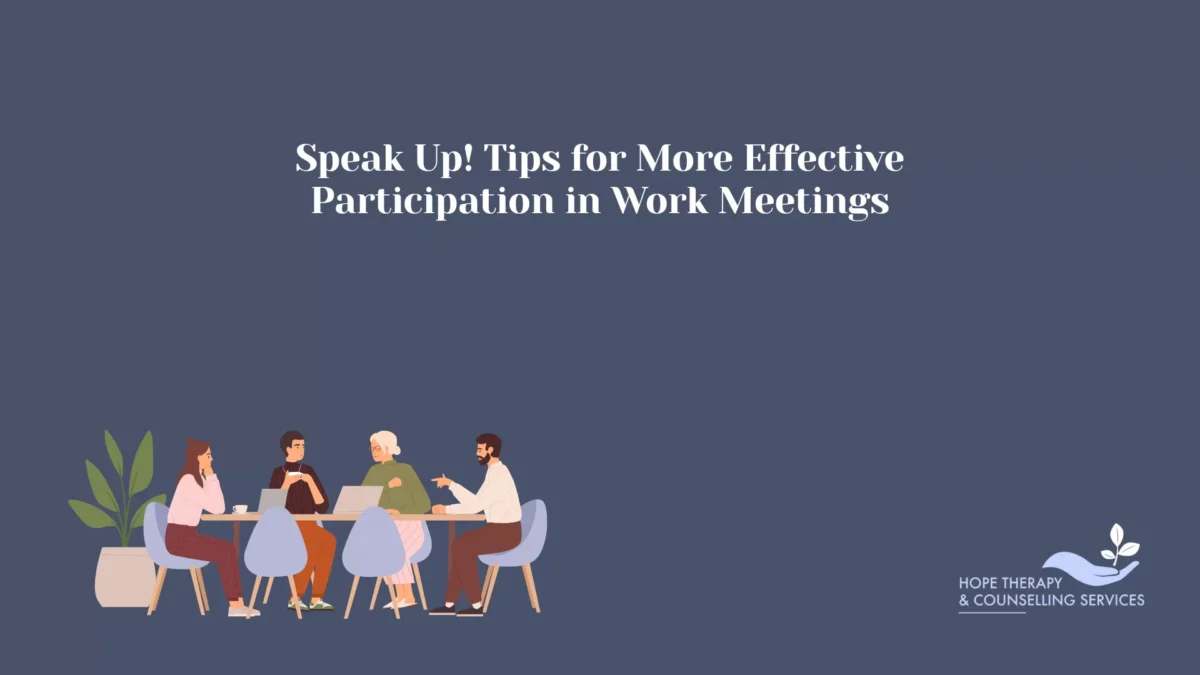Finding your voice, even when it feels easier to stay quiet.
You have something to say — so why is it so hard to say it?
You rehearse it in your head. You’ve thought it through. You know what you’re talking about.
But when the moment comes — the team meeting, the group discussion, the chance to offer your thoughts — something tightens. Your mouth stays shut. Your voice disappears. You nod along. Smile. Wait for it to be over.
Afterwards, you might feel frustrated with yourself. Why didn’t I just speak up?
This is more common than you might think — especially if you’re naturally reflective, have experienced criticism or dismissal in the past, or grew up in environments where speaking out wasn’t encouraged. Whether you’re new to the workplace or decades into your career, the pressure to say something “clever” or “just right” can be paralysing.
Counselling can help you understand what’s happening beneath the surface — and begin to work gently with the fear, doubt, or overthinking that gets in the way.
What’s actually going on when you go quiet?
It’s rarely about a lack of knowledge or ideas. In counselling, the real block tends to sit deeper:
- Fear of judgement: “What if I sound stupid?”
- Imposter syndrome: “I don’t belong here.”
- Perfectionism: “If I can’t say it perfectly, I won’t say it at all.”
- People-pleasing: “I don’t want to disagree or take up too much space.”
- Past experiences: “When I’ve spoken up before, it didn’t go well.”
The body can respond to all of these with a subtle freeze — tight chest, dry mouth, racing thoughts, silence. Even if you want to contribute, your nervous system might be doing its best to keep you “safe” by keeping you small.
How counselling can support your voice
In counselling, we don’t force confidence. We create space to explore what’s holding it back.
Together, you might look at:
- Where the fear started: Did something or someone teach you that your voice didn’t matter, or wasn’t welcome?
- What you learned to believe: Are there unhelpful thought patterns around authority, visibility, or not being “enough”?
- The role of the inner critic: That voice that says “don’t say that” or “you’ll mess it up” — where did it come from?
- The cost of silence: How is not speaking up affecting your work, your confidence, or your wellbeing?
Counselling can help you practise accessing your voice — not just professionally, but in all parts of your life. It’s about helping you feel more grounded, not louder. More present, not performative.
Tips to help you speak up — in your own way
You don’t need to become the loudest person in the room. Just a little more you in the room.
1. Pause before you jump to silence
Often, we silence ourselves in the first 2 seconds of an idea forming. Try buying yourself time: “Let me think about that for a moment…” or “I do have a thought — just gathering it.”
2. Use your style
Some people think out loud. Others reflect quietly and speak less often — but with clarity. You don’t need to change who you are to participate. Use your natural strengths.
3. Write your point beforehand
If a meeting is planned, jot down 1–2 points you’d like to contribute. Having them in front of you can take the edge off the nerves.
4. Start small
Agreeing with someone’s point, asking a question, or summarising a discussion can be just as impactful as offering a new idea.
5. Challenge your inner script
If your mind says, “That’s not worth saying,” or “People will roll their eyes” — pause. Would you say that to someone else trying to contribute? Probably not.
This isn’t about becoming someone else
Finding your voice doesn’t mean becoming loud, pushy, or overconfident. It means trusting that your thoughts, questions, and insights matter — and that you don’t have to say everything perfectly to be taken seriously.
Sometimes, the hardest part isn’t speaking up. It’s believing you’re allowed to.
FAQs: Speaking Up in the Workplace
Q: What if I speak up and feel embarrassed afterwards?
A: That post-meeting self-criticism is common — and often harsher than reality. Most people are too focused on their own contribution to judge yours. Counselling can help you quiet the inner critic that makes you second-guess everything.
Q: I get physically anxious — racing heart, dry mouth, red face. Can I change that?
A: Yes. Grounding techniques, breathing tools, and nervous system support can reduce the physical symptoms of anxiety over time. In counselling, we work with both the body and the mind.
Q: What if I’m naturally quiet? Do I have to speak more?
A: No. But if silence is coming from fear — not choice — then it might be worth exploring. You don’t need to speak more. Just more freely.
Need help finding your voice?
If meetings leave you feeling small, silenced or stuck in your head, counselling can help you understand why — and work through it gently, at your own pace.
You don’t have to push yourself to perform. You just have to come as you are.
🕊️ Free consultation: hopefulminds.co.uk/free-consultation-with-hope-therapy

